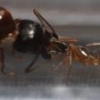The first colony I started was Myrmecocystus (Aug. 2017). So far they have been pretty easy, but I started them by digging a small established colony, so starting with a newly mated queen may be more difficult. When they were collected we found the queen, about 20 workers, and 1 partially full replete. We started them in a hydrostone-based container with a rock for the queen and repletes to hide/hang under. Since then we have added a second chamber (petri dish with hydrostone) connected with tubing that they seem to like to use for pupae. The colony has doubled in size and we have several repletes hanging under the rock. We mostly feed them Karo syrup and occasionally put in a mealworm or boiled egg.
I probably wouldn't have started with honey pots except that it was the first opportunity that presented itself. As your colony grows, make sure there is structure for the repletes to hang (a rock or some mesh). They love sugar, but need a little protein. Since you live in Oceanside it would probably easier for you to acquire some Pogonomyrmex or Camponotus queens.
We are hoping to move our honeypot colony into a display exhibit this winter, so maybe my opinion about honey pots being easy with change.


















